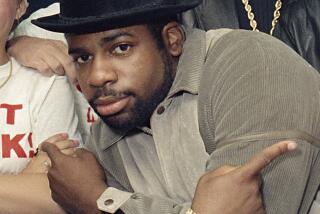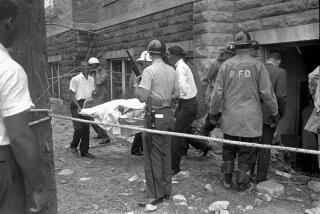McVeigh Trial Begins With Plays to Emotion
DENVER — His back to Timothy J. McVeigh, his eyes to the jury, the chief prosecutor in the Oklahoma City bombing case opened the long-awaited trial Thursday in a quiet, trembling voice, recounting how little Tevin Garrett and his mother, Helena, said goodbye for the last time.
Tevin was 16 months old and a preschooler at the second-floor day-care center in the Alfred P. Murrah Federal Building. His mother dropped him off there on the morning of April 19, 1995. Then she left the building, looking back one last time at the plate-glass windows where the children sometimes pressed their hands in farewell.
Moments later, said prosecutor Joseph H. Hartzler, McVeigh parked a Ryder rental truck loaded with a 2-ton ammonium nitrate bomb “right below those plate-glass windows.”
“The truck was there to impose the will of Timothy McVeigh on the rest of America,” he said, “and to do so by premeditated violence and terror, by murdering innocent men, women and children, in hopes of seeing blood flow in the streets of America.
“The man who committed this act is sitting in this courtroom behind me,” Hartzler added. “And he’s the one who committed those murders.”
McVeigh faces federal murder and conspiracy charges in connection with the blast that killed 168 people (including 19 children), injured more than 500 others and sealed the realization that the nation was not safe from political terrorism.
Throughout the day Thursday, both the prosecution and the defense turned their rhetoric on the emotions of that day.
As McVeigh’s attorney, Stephen Jones, rose to give his own opening statement, he took a long breath and then slowly read the names of the dead.
“I have waited two years for this moment,” he told the jury of seven men and five women, hoping to exonerate his client.
Jones noted that President Clinton and Atty. Gen. Janet Reno addressed the nation within hours of the blast. He said 12,000 people, including the president, attended a memorial service in Oklahoma City. And he noted that a $2-million reward was posted for the arrests of the bombers, and that the FBI’s investigation was the largest in U.S. history.
But, Jones said, “the question is, did they get the right man?”
Outside, a late-season storm was burying Denver in snow. Inside the courthouse, more than 100 victims, spectators and reporters were crowded into U.S. District Judge Richard P. Matsch’s high-ceilinged, wood-paneled courtroom. Another 50 prosecutors, FBI agents, marshals, defense lawyers and investigators were also in the room.
To the far right, farthest from the jury, sat McVeigh. He wore a blue plaid shirt and tan slacks. His hair, as always, was cropped short. His skin color was a prison pallor from two years behind bars. He entered the courtroom smiling and at ease, shaking hands, visiting with his lawyers. When the jury entered, McVeigh was introduced. He stood, folded his hands, bowed his head and said, “Morning.”
But when Hartzler began addressing the jury, and described McVeigh’s hatred of the government and his alleged plans to avenge the 80 people killed during the 1993 FBI raid near Waco, Texas, McVeigh suddenly lost his smile. For the rest of the day, he sat with his forehead knotted, his eyes fixed. He never seemed to lose his frown.
If convicted, McVeigh, who turned 29 on Wednesday, could face the death penalty. His former Army buddy, Terry L. Nichols, who also has been charged in the bombing, will stand trial later.
Hartzler repeatedly mocked McVeigh for allegedly wearing earplugs to deafen the noise as he ran from the scene of the bombing. And he ridiculed McVeigh for fancying himself an American patriot starting another revolution in his country.
“The statements of our forefathers can never be twisted to justify warfare against innocent children,” Hartzler said. “Our forefathers didn’t fight British women and children. They fought other soldiers. They fought them face to face, hand to hand. They didn’t plant bombs and run away wearing earplugs.”
He outlined critical pieces of evidence against the former Persian Gulf War soldier turned anti-government activist, showing that he fancied himself a modern-day revolutionary. He said they include:
* When McVeigh was arrested 90 minutes after the blast, he was wearing a T-shirt with a picture of Abraham Lincoln and the quote that his assassin, John Wilkes Booth, shouted in Ford’s Theater: “Sic semper tyrannis!” (Death to tyrants!)
On the back of the shirt was a quotation from Thomas Jefferson: “The tree of liberty must be refreshed from time to time with the blood of patriots and tyrants.”
* In McVeigh’s car was found a large envelope full of various anti-government tracts, including one from one of America’s Founding Fathers that said: “When the government fears the people, there is liberty.” Next to it, McVeigh allegedly had written: “Maybe now there will be liberty.”
* In the car of the state trooper who arrested McVeigh was a note McVeigh left behind. It was a business card from a gun dealer on which McVeigh allegedly had scribbled: “TNT at $5 a stick. Need more. Call after May 1.”
* Shortly before the bombing, McVeigh advised his sister, Jennifer, that “something big is about to happen.”
* And, in an apparently direct challenge to what happened near Waco, McVeigh left behind a computer file addressed to the federal Bureau of Alcohol, Tobacco and Firearms. It was titled “ATF Read” and it said: “All you tyrannical [expletives] will swing in the wind one day for your treasonous actions against the Constitution and the United States. Die, you spineless cowardice bastards.”
Hartzler said his team of prosecutors will show that McVeigh and Nichols conspired to accumulate ammonium nitrate, detonation cord, fuel oil and barrels, then stored the materials in public lockers around Kansas, and waited for April 19--the two-year anniversary of the Waco assault.
McVeigh, Hartzler said, rented the truck under an alias and then dropped off a getaway car in Oklahoma City--with Nichols’ help. He said a surveillance camera there twice captured Nichols’ pickup in Oklahoma City.
But on the day of the bombing, Hartzler said, it was McVeigh alone who delivered the bomb to the Murrah building. He said residue found on McVeigh’s clothing is consistent with a components of a detonation cord. And he said a piece of the inside of the truck showed crystals consistent with ammonium nitrate.
“In the end, we’ll build a solid wall of evidence against McVeigh,” he said, “making your job of determining his guilt easy, I believe.”
Hartzler’s opening spanned two hours. Next up was Jones. He addressed the jury for not quite three hours.
Jones attacked the credibility of the government’s witnesses. He noted that three employees at the Ryder agency in Junction City, Kan., could not agree on whether one or two people rented the truck, or whether McVeigh was one of them.
He said records from phone debit cards McVeigh and Nichols allegedly used to further their conspiracy will not hold up because they are inaccurate and confusing.
He particularly attacked Michael Fortier, an Army buddy of McVeigh’s, who has pleaded guilty to lesser charges and will be one of the government’s key witness. He described Fortier and his wife, Lori, also a government witness, as heavy drug users, liars and people who would say anything to save themselves.
And Jones warned jurors they will learn that the FBI crime lab, which analyzed some of the forensic evidence in the case, allowed much of it be contaminated, and that lab officials “slanted” their analyses to help the prosecution.
“When you see the evidence in this case, you will conclude that the investigation of the Alfred P. Murrah Building lasted about two weeks,” Jones said. “The investigation to build the case against Timothy McVeigh lasted about two years.”
But he said that early on in the case, the government knew “that there was something terribly wrong, something missing.”
Then, quoting radio commentator Paul Harvey, Jones said: “Our evidence will be the rest of the story.”
The first testimony in the government’s case will be presented today, most likely an audiotape of the blast and the shouts of terrified people in downtown Oklahoma City.
(BEGIN TEXT OF INFOBOX / INFOGRAPHIC)
Unveiling Their Cases
Lawyers in the Oklahoma City bombing laid out their strategies in opening statements.
THE PROSECUTION
“[The bombing] was . . . to impose the will of Timothy McVeigh on the rest of America by murdering innocent men, women and children . . . “
--Joseph Hartzler
****
THE DEFENSE
“But the question is, did they get the right man?”
--Stephen Jones
Source: Rocky Mountain News, Associated Press
(BEGIN TEXT OF INFOBOX / INFOGRAPHIC)
The Jurors
Descriptions of the jurors who are hearing Timothy McVeigh’s trial:
1. A grandmother who said she watched some of the television coverage of the bombing, crying and praying for victims. She remembered seeing McVeigh being escorted out of the Noble County, Okla., jail in an orange jumpsuit. “I felt very sorry for him ... for such a young man to waste his life.”
2. A woman who teaches learning-disabled children and said she is a “soft touch” for children and favors rehabilitation for offenders. She said McVeigh “looks like a nice kid.
3. A transit agency landscaper who said he is a sports fan, and doesn’t follow the news. He said he was moved by the plight of the children in the bombing.
4. A retired Sears employee who interrupted the judge during questioning to offer her opinions about the death penalty--she’s in favor of its limited use.
5. A Vietnam War veteran and former appliance salesman who is working in real estate. He said he could set aside his feelings about the war to sit on the jury.
6. A computer technician said he gave both clothing and food to the bombing relief effort as part of his company’s effort. He said he believed McVeigh was “a likely suspect, yes. That he’s guilty or not guilty, no.”
7. A registered nurse with three daughters was worried aboutserving on the jury because her employer, a non-profit agency, would not pay her salary. She said she heard the suspects had a link to the Waco, Texas, raid.
8. A married maintenance worker for a grocery store chain who said he reads the Bible once a week. He remembered some details of the bombing, including McVeigh’s escort from the jail and the Ryder truck.
9. A government housing property manager said society believes that the death penalty is acceptable punishment for some offenses. He said he wasn’t sure that accomplices are acceptable witnesses.
10. A young restaurant employee who graduated from college and once worked in a stockbroker’s office. She moved to Colorado from Minnesota. She said she followed news of the bombing and rescue effort. She said she “could live with herself” if she had to impose her death penalty.
11. An engineer who is the son of a career Air Force man and was born in the Netherlands. He attended college in Arizona and Wyoming and reads The Wall Street Journal. He said the death penalty is acceptable in some instances.
12. A computer programmer who works on contract with the Air Force and is a retired Air Force veteran. He said the death penalty is “a viable means of punishment for certain crimes. It should not be rendered lightly.”
Source: Associated Press
More to Read
Sign up for Essential California
The most important California stories and recommendations in your inbox every morning.
You may occasionally receive promotional content from the Los Angeles Times.











